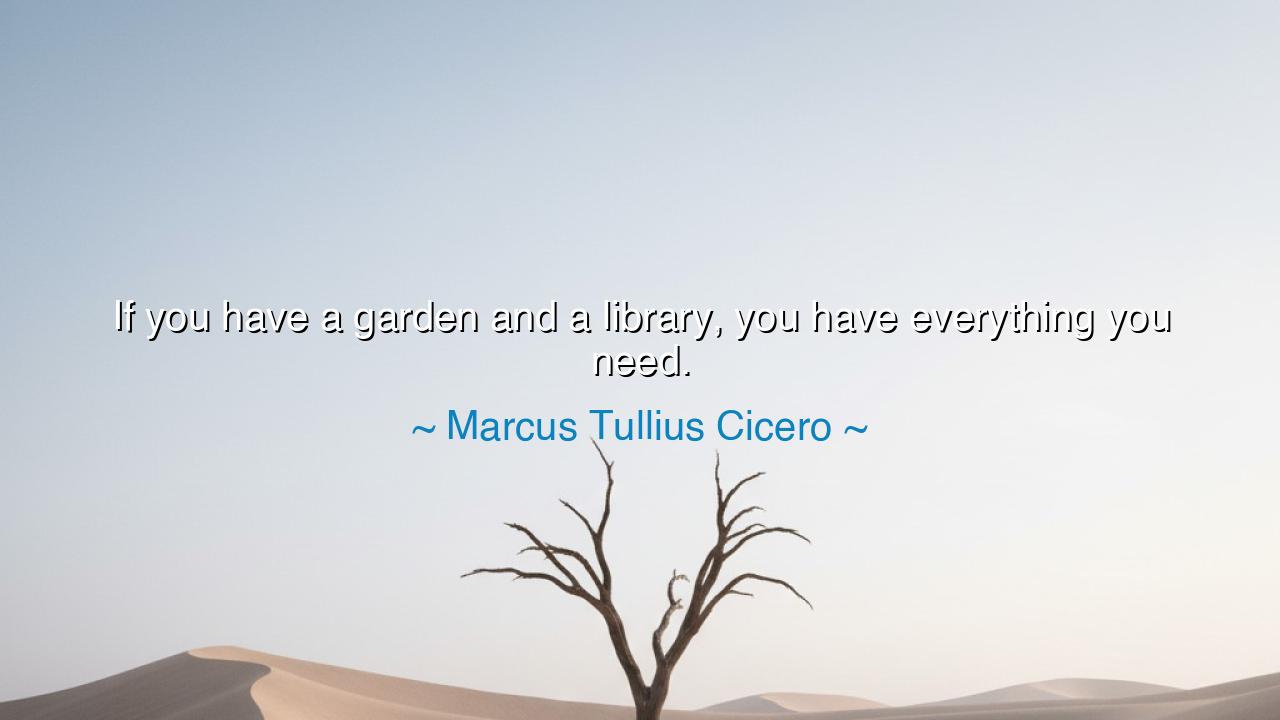
If you have a garden and a library, you have everything you need.






In the quiet wisdom of the ancients, there lies a truth that has echoed through the ages, spoken not only by philosophers, but by those who understood the deepest needs of the human soul. The great Marcus Tullius Cicero once said, "If you have a garden and a library, you have everything you need." In these simple words, Cicero reminds us of the profound harmony between nature and knowledge, and how these two realms, when united in our lives, offer all that the heart and mind require for a life of fulfillment, purpose, and true peace.
The garden and the library, though seemingly disparate, are in fact two sides of the same coin. The garden is a sanctuary for the body and spirit—a place of growth, renewal, and reflection. To cultivate a garden is to work in harmony with the earth, to nurture life from seed to bloom, and to experience the eternal cycles of birth, growth, and death. The garden is both a source of nourishment and beauty, where the senses are awakened by the scent of flowers, the touch of soil, and the sight of life unfolding. To work in the garden is to connect with the very essence of life itself, to feel the pulse of the earth and know that we, too, are part of this grand cycle.
In contrast, the library is the domain of the mind—a place of learning, wisdom, and the deep, unending pursuit of knowledge. Through books, we have the keys to the vast storehouse of human experience, spanning centuries of thought, struggle, and achievement. The library is where we can seek understanding, where the great thinkers of the past speak to us across time, guiding our actions and decisions. It is through the library that we gain insight into the complexities of the human condition, and it is there that we discover not only the world as it is, but the world as it could be.
Cicero, in his infinite wisdom, knew that life is not a mere accumulation of wealth or fleeting pleasures, but a journey of the body, mind, and spirit. To nourish one’s body, the garden is essential. To nourish one’s mind, the library is essential. In this simple yet profound balance, we find the full spectrum of human experience. The garden provides the roots that anchor us to the earth, while the library offers the wings that allow us to soar. Together, they create a life of harmony and wholeness, where both physical and intellectual growth can occur in a space of peace and contentment.
Consider the example of the great philosophers of antiquity, such as Aristotle, who is said to have established a garden at his school in Athens, the Lyceum. In this garden, Aristotle gathered his students, teaching them not only the great lessons of philosophy but also how to live in harmony with nature. His teachings were grounded in the belief that to truly understand the world, one must study both the external world and the inner workings of the mind. The garden, for Aristotle, was not just a place for walking and contemplating but a symbol of the balance between mind and nature, where students could find both nourishment and inspiration.
There is also the example of Thomas Jefferson, a man deeply influenced by Cicero’s thinking, who embraced both the natural world and intellectual pursuits. At his Monticello estate, Jefferson cultivated not only a magnificent garden but a vast library of books. For Jefferson, the garden was a place of peace, where he could reflect and reconnect with the earth, while the library was a place for the mind to flourish. It was in this balance that he found the strength to shape his vision of a new nation. Jefferson, like Cicero, understood that a full life requires both the physical and the intellectual, both the earth and the mind.
The lesson for us is clear: in our modern world, where distractions pull us in every direction, we must remember the power of simplicity. A garden and a library offer us all we need for a life of depth and meaning. In tending to a garden, we cultivate not only plants but patience, care, and mindfulness. In reading, we cultivate wisdom, compassion, and understanding. Both are essential, for without the nourishment of nature, we lose touch with our roots, and without the nourishment of knowledge, we lack the wisdom to grow.
Let us, then, embrace Cicero's wisdom and cultivate our own gardens. Whether you plant flowers, vegetables, or a small herb garden, take the time to connect with the earth, to nurture life, and to witness the cycles of growth. Similarly, let us build our libraries—not just with books, but with the knowledge and wisdom that feed our minds and guide our lives. In this balance of earth and mind, we will find everything we need to live fully, to be at peace, and to contribute to the world in ways that are meaningful and lasting. Nourish both body and spirit, and in doing so, create a life of profound fulfillment and wisdom.






AAdministratorAdministrator
Welcome, honored guests. Please leave a comment, we will respond soon